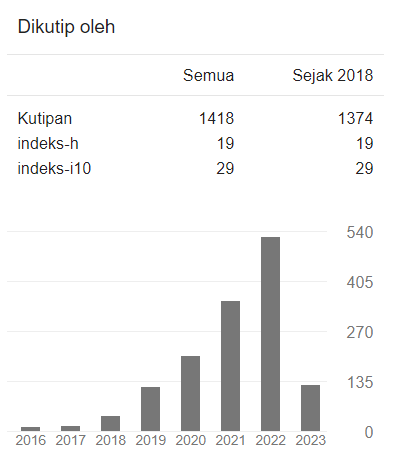Peningkatan Fisik Motorik Menggunakan Modifikasi Permainan Pada Pembelajaran Penjas Melalui Lesson Study Di SDIB KBRI Thailand
DOI:
https://doi.org/10.22219/jp2sd.v10i2.20727Abstract
This research aims to improve children's physical motor skills through physical education learning at Indonesian Elementary Schools at the Indonesian Embassy in Thailand in the form of game modifications. Game modification in sports learning needs to be done to create new innovations in the field of sports education, which is no less important than fulfilling the growth and development of elementary school children. It aims to accommodate the needs at every stage of concrete operational development experienced by elementary school children abroad, it is necessary to use concrete games for children and develop children's physical motor skills. This study employed a qualitative descriptive method that focused on improving physical motor skills using game modifications in physical education through a Lesson Study. The design that has been carried out using the Pre-Experimental Design type of research in the form of Lesson Study Implementation at the SDIB Indonesian Embassy in Thailand can be the Key to the Implementation of Research using Lesson Study in SDIB of the Indonesian Embassy in Thailand that at the planning stage that has been prepared for RPP, LK and evaluation of LS learning, the stages are carried out by model teachers accompanied by observers and the research team., LS is carried out in 2 cycles each. The data on the results of increasing the physical motor skills of 4th-grade students of the Indonesian Embassy in Thailand in the first cycle was 72.5; Cycle II is 77, which means that the modification of the game has an impact on students' physical motor skills as well as on the enthusiasm and activeness of students in carrying out learning activities and so that the results of students' motoric physical ability from cycle I to cycle II have increased.
Downloads
References
Ace, Loeziana. 2017. The golden age: Masa efektif merancang kualitas anak. Bunayya : Jurnal Pendidikan Anak. 1 (2). 77-92
Anwar, M. 2018. Menjadi guru profesional. Prenada Media.
Arifin, Bustanol and Fantiro, Frendy Aru and Ulum, Bahrul. 2018 Peningkatan Kecerdasan Kinestetik Menggunakan Modifikasi Permainan Pada Lesson Study di SD Moh Hatta Malang. JINoP (Jurnal Inovasi Pemebelajaran), 4 (2). pp. 123-131
Arikunto, S. 2016. Prosedur Penelitian Suatu Pendekatan Praktik. Jakarta: Rineka Cipta.
Breslin, dkk. (2012). The Effect of Teachers Trained In A Fundamental Movement Skills Programme on Children’s Selfperceptions And Motor Competence. European Phsycial Education Review, 18 (1), 114-126
Decaprio, R. 2013. Aplikasi Teori Pembelajaran Motorik di Sekolah. DIVA Press. Jogjakarta
Desmita. 2012. Psikologi Perkembangan Peserta Didik, Bandung-PT. Remaja Rosdakarya:
Elvinawati, Sumpono dan Hermansyah Aminr. 2012. Lesson Study pada Mata Kuliah Kimia Sekolah I Sebagai UpayaPeningkatan Kualitas Pembelajaran dan Pembangunan Karakter (Character Building). Jurnal Exacta
Husdarta, 2013. Belajar Dan Pembelajaran Pendidikan Jasmani Dan Kesehatan. Bandung: Alfabeta
Kemdikbud. 2003. Permendikbud Nomor 20 Tahun 2003 tentang Sistem Pendidikan Nasional. Jakarta: Kemdikbud
Khaironi, M. 2018. Perkembangan anak usia dini. Jurnal Golden Age Hamzanwadi University
Kurniansyah, M. F., & Kumaat, N. A. 2021. Analisis Gerak Motorik Anak Usia 9-11 Tahun Melalui Permainan Lompat Tali pada Siswa SD Negeri 34 Gresik. Jurnal Kesehatan Olahraga UNESA, 9(03).
Mahfud, I., & Fahrizqi, E. B. 2020. Pengembangan Model Latihan Keterampilan Motorik Melalui Olahraga Tradisional Untuk Siswa Sekolah Dasar. Sport Science and Education Journal, 1(1).
Manan, A. 2020. Peningkatan Pembelajaran Lari Sprint Melalui Pendekatan Bermain Kelas V SD Negeri Jiyu Ii Kecamatan Kutorejo Kabupaten Mojokerto. Jurnal Pedagogi: Jurnal Penelitian dan Pendidikan, 1(2), 37-44.
Muhtar, T., & Lengkana, A. S. (2019). Pendidikan jasmani dan olahraga adaptif. UPI Sumedang Press..
Mukhlis, Abdul, & Sopari, Muhammad. 2021.Progresif Group dan Digital Based Learning Sebuah Model Pemberlajaran Alternatif pada Masa Pandemi Covid 19. Prosiding Transformasi Pembelajaran Nasional Vol 1:“Peluang dan Tantangan Pembelajaran Digital di Era Industri 4.0 Menuju Era 5.0”, 152.
Nurazianti. Indarto, , Wusono. Puspitasari Enda. 2018. Pengaruh Permainan Halang Rintang Terhadap Kemampuan Motorik Kasar Anak Usia 5-6 Tahun Di TK Negeri Pembina 3 Pekanbaru, Jurnal Online Mahasiswa FKIP Universitas Riau. 5(1). 1-15
Prastowo, A. 2018. Permainan tradisional Jawa sebagai strategi pembelajaran berbasis kearifan lokal untuk menumbuhkan keterampilan global di MI/SD. JMIE (Journal of Madrasah Ibtidaiyah Education), 2(1), 1-28.
Ramadhani, P. R., & Fauziah, P. Y. (2020). Hubungan Sebaya dan Permainan Tradisional pada Keterampilan Sosial dan Emosional Anak Usia Dini. Jurnal Obsesi: Jurnal Pendidikan Anak Usia Dini, 4(2), 1011-1020.
Rahyubi, Heri. 2014. Teori-teori Belajar dan Aplikasi Pembelajaran Motorik. Bandung: Nusa Media.
Rinaldi, M.S. 2019. Tingkat Kemampuan Motorik Siswa Kelas Atas Di Sekolah Dasar Negeri Gadingan Wates Tahun 2018/2019. Jurnal Pendidikan Jasmani Kesehatan danOlahraga, (2), pp. 2–5.
Rohendi dan Seba. 2017. Perkembangan Motorik Pengantar Teori Dan Aplikasinya Dalam Belajar. Bandung: Alfabeta
Sari, Budiyah Febriya & Raihana. 2021. Pengaruh Permainan Tradisional Engklek Terhadap Perkembangan Fisik Motorik Kasar Anak Usia 5-6 Tahun. GENERASI EMAS: Jurnal Pendidikan Islam Anak Usia Dini.1-10. 4(2). 74-83
Sinurat, L., Rahman, A., & Matondang, Z. (2021). Pembinaan Guru Melalui Workshop Pembelajaran Berbasis Inquiri untuk Meningkatkan Mutu Pembelajaran di Sekolah Menengah Pertama. In Seminar Nasional Peningkatan Mutu Pendidikan (Vol. 2, No. 1, pp. 211-216).
Suyitno, S., & Setiawan, F. B. 2021. Penguatan Permainan Tradisional Dalam Membentuk Karakter Siswa di SD Muhammadiyah Se-Kecamatan Depok. Prosiding Seminar Nasional Pendidikan Dasar 2021 PGSD Universitas Purworejo Vol. 3.
Syamsul, Y. 2014. Psikologi Perkembangan Anak dan Remaja. Bandung: PT.Remaja Rosdakarya
Waspada, Edy.2014.Perbedaan pengaruh permainan tradisional dan latihan kecerdasan kinestetik terhadap kemampuan motorik dan kecerdasan emosional, dalam TESIS, (Surakarta: Universitas Sebelas Maret
Wiadnyana, I Gusti Ngurah Sastra. Sudiana, i Ketut , Tisna, Gede Doddy. 2015 Pengaruh Pelatihan Zig Zag Run Terhadap Kecepatan dan Kelincahan. Jurnal IKOR Universitas Pendidikan Ganesha Jurusan Ilmu Keolahragaan, 4 (1), 1-10
We, A. Y., & Fauziah, P. Y. 2020. Tradisi Kearifan Lokal Minangkabau “Manjujai” untuk Stimulasi Perkembangan Anak Usia Dini. Jurnal Obsesi: Jurnal Pendidikan Anak Usia Dini, 5(2), 1339-1351.
Yulianti, R., & Mahardhani, A. J. 2015. Pendidikan Karakter Berkelanjutan Dalam Pembelajaran Di Sekolah. Prosiding Seminar Nasional: Memperkuat Nilai Karakter Keindonesiaan Memasuki Masyarakat Ekonomi ASEAN 2015, 89.
Downloads
Published
Issue
Section
License
Copyright (c) 2022 Jurnal Pemikiran dan Pengembangan Sekolah Dasar (JP2SD)

This work is licensed under a Creative Commons Attribution-ShareAlike 4.0 International License.
Authors who publish with Jurnal Pemikiran dan Pengembangan Sekolah Dasar (JP2SD) agree to the following terms:
- For all articles published in Jurnal Pemikiran dan Pengembangan Sekolah Dasar (JP2SD), copyright is retained by the authors. Authors give permission to the publisher to announce the work with conditions. When the manuscript is accepted for publication, the authors agree to automatic transfer of the publishing right to the publisher.
- Authors retain copyright and grant the journal right of first publication with the work simultaneously licensed under a Creative Commons Attribution-ShareAlike 4.0 International License that allows others to share the work with an acknowledgment of the work's authorship and initial publication in this journal.
- Authors are able to enter into separate, additional contractual arrangements for the non-exclusive distribution of the journal's published version of the work (e.g., post it to an institutional repository or publish it in a book), with an acknowledgment of its initial publication in this journal.
- Authors are permitted and encouraged to post their work online (e.g., in institutional repositories or on their website) prior to and during the submission process, as it can lead to productive exchanges, as well as earlier and greater citation of published work (See The Effect of Open Access).

This work is licensed under a Creative Commons Attribution-ShareAlike 4.0 International License.


















